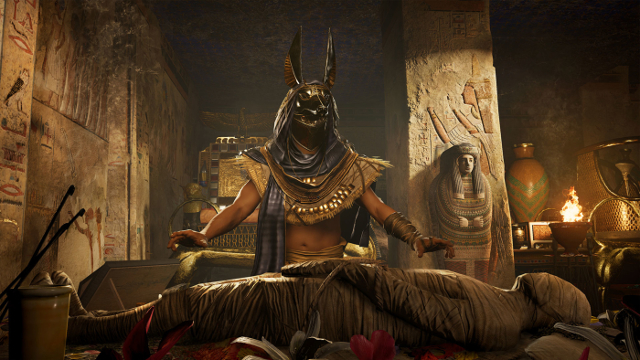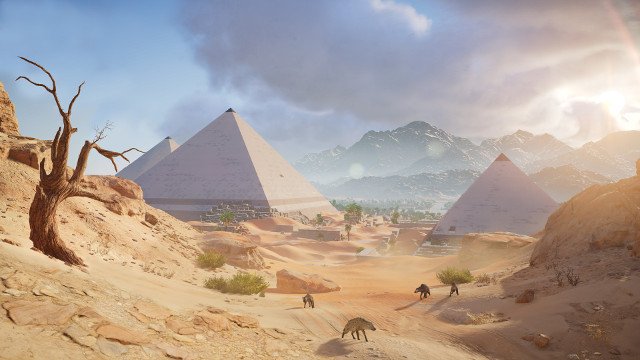For the first time in ten years, the right trigger isn’t the sprint button in Assassin’s Creed: Origins. In fact, there’s no sprint button whatsoever. That may not seem like much, but this seemingly small change displays Origins’ commitment to reinvigorating the franchise. And after spending some time with the game, I have confidence it will achieve just that or come close to it.
The original Assassin’s Creed came out ten years ago and every game since has adhered to certain guidelines, which is great for consistency’s sake but made the series feel a little samey from game to game. Fatigue eventually set in and although Assassin’s Creed Syndicate was received relatively well, it caused Ubisoft to take a year off from the series.
Or, at least, that’s what I thought until I spoke to Ashraf Ismail, the game director of Assassin’s Creed: Origins. He said the year off was something they went into the game wanting to do and was not a reactive decision.
“We were asking ourselves very fundamental questions about the granular experience of Assassin’s Creed,” said Ismail, “and since we we’re opening such big subjects and telling ourselves that we need to refresh the series and that we need to bring something new, we needed the time to do it.”

“We discussed it with upper management and told them we needed the time to make this game and to do it right. I think if we didn’t have that year, we wouldn’t have shipped this game. We would have shipped a different game; a smaller version.”
Knowing that the franchise needed a shot in the arm gave them the courage to add to and change core systems. Melee combat has changed in almost every entry and has taken a more deliberate approach here in Origins. Well-timed strikes, dodges, and parries were encouraged and almost necessary since I often found myself outnumbered. Singling out enemies, locking onto them, and then quickly countering their attacks was the best way to tip the odds back in my favor. Although, that didn’t always work since I kept getting set ablaze by fire arrows and bludgeoned with spiked maces as I stubbornly kept falling back on the now-defunct strategy of taking multiple guards head-on. Origins’ deadly enemies gave combat a sense of urgency and tension and the mechanics surrounding the duel-centric fights were able to support that more hardcore and tactical approach.
Since I wasn’t fighting cumbersome controls or walking into a compound completely blind, I felt more prepared, sneaky, and badass; something the series always fumbled with during the grand assassination missions.
Despite the improved combat, I did my best to avoid it by sneaking around. Stealth has always been an idiosyncratic sticking point for the series since the controls always lacked the finesse that a good stealth game requires; an ironic downside to a franchise about cloaked assassins. I felt much more in control here, as pulling up the bow and crouch walking were quick and responsive. The fluid controls were supplemented by Senu, your pet eagle that functions similarly to the owl in Far Cry: Primal. Senu’s literal bird’s eye view of the terrain allows you survey the land and tag guards, letting players plan more effectively and avoid getting caught.
Since I wasn’t fighting cumbersome controls or walking into a compound completely blind, I felt more prepared, sneaky, and badass; something the series always fumbled with during the grand assassination missions. This all culminated when I climbed up on a rooftop and used Senu to harass a nearby guard. As he stopped in his tracks to swat away my pesky feathered friend, I quickly lined up my bow and put an arrow in his eardrum from thirty yards away. Small moments like these popped up a few times and feel like the organic Open-World Moments™ that the franchise has sorely lacked. I wasn’t just going through the motions; I was creating them and, while my toolset was limited during my demo, I can only hope that more gadgets and abilities will further expand the potential for more scenes like this.
While Origins has seemingly embraced unscripted moments of other open worlds, it has discarded one sacred trait of them: the mini-map. Icons are now regulated to a compass line at the top of the screen, rather than circular map at the bottom, similar to Horizon Zero Dawn. Ismail says this was a deliberate choice to get players to draw players into ancient Egypt.
“We build these beautiful worlds and we have amazing artists and as a player and when we do eye-tracking tests, people are staring at a mini-map,” said Ismail. “The goal was to be looking at the game world and to be consumed by the beauty of the world. There’s a lot of design that was built-in to the art and architecture to hint what you should see and what you should find in the world and how to move through it.”
Icons are now regulated to a compass line at the top of the screen, rather than circular map at the bottom, similar to Horizon Zero Dawn. Ismail says this was a deliberate choice to get players to draw players into ancient Egypt.
Moving through the large, contiguous rendition of Egypt was made to be more organic and the lack of a mini-map forced Ubisoft to find other ways to convey that information. Ismail stated that they wanted to avoid using the mini-map as a design crutch and, thus, it has seemingly been in efforts to make the player actually explore the more dense, rich environment. I’m a little skeptical but curious to see how Origins will balance force feeding objectives to the player and natural exploration.
I’m also curious on the story, which is something they were tight-lipped about. You play as Bayek, a member of the police force called the Medjay, and how he founded the Brotherhood with his wife, Aya. While details were sparse, the story will focus on Bayek’s and Aya’s marital relationship and how that will lead to the genesis of the Creed we see today. Ismail explained how that was a very early narrative goal for his team.

“When we were thinking about the birth of the Brotherhood, it wasn’t a group of people who just wanted to start a group and go after this philosophy of life,” said Ismail. “We were thinking about family and we thought we could represent a relationship, a marriage, of two people who have similar ideals who look at life similarly but who have a tense relationship in terms of love.”
“When they go through a struggle, how do they face it together? We wanted that tension and drama and to showcase that with two people who still love one another can also look at life differently.”
Assassin’s Creed III dealt with a dysfunctional father and son relationship while Syndicate examined the bond between two siblings, but gaming in general rarely deals with marriage. Aya and Bayek seemed like strong, independent individuals in the mission I saw, but I did not get a sense of a strong couple, something I can only hope the full game contextualizes well.
I only played a tiny fraction of what Assassin’s Creed Origins has to offer so it’s entirely possible that it could end up repeating the series’ past mistakes if given more time. The map could end up being flooded with too many meaningless chores. The controls could crumble under pressure as time passes and the game gets harder. And the missions could very easily fall into uninspired, predictable patterns if I played more than a couple of them. While those concerns give me valid reasons for pause, the parts I played gave me hope that this could truly be what Assassin’s Creed needed. It seems to know what made the series special in the early years of the last generation but also what made it crumble shortly after. Knowing is half the battle and we have to wait until October 28th to see if they successfully execute on that knowledge.







